How to Become a Shopify Plus Partner in 2025: Key Requirements
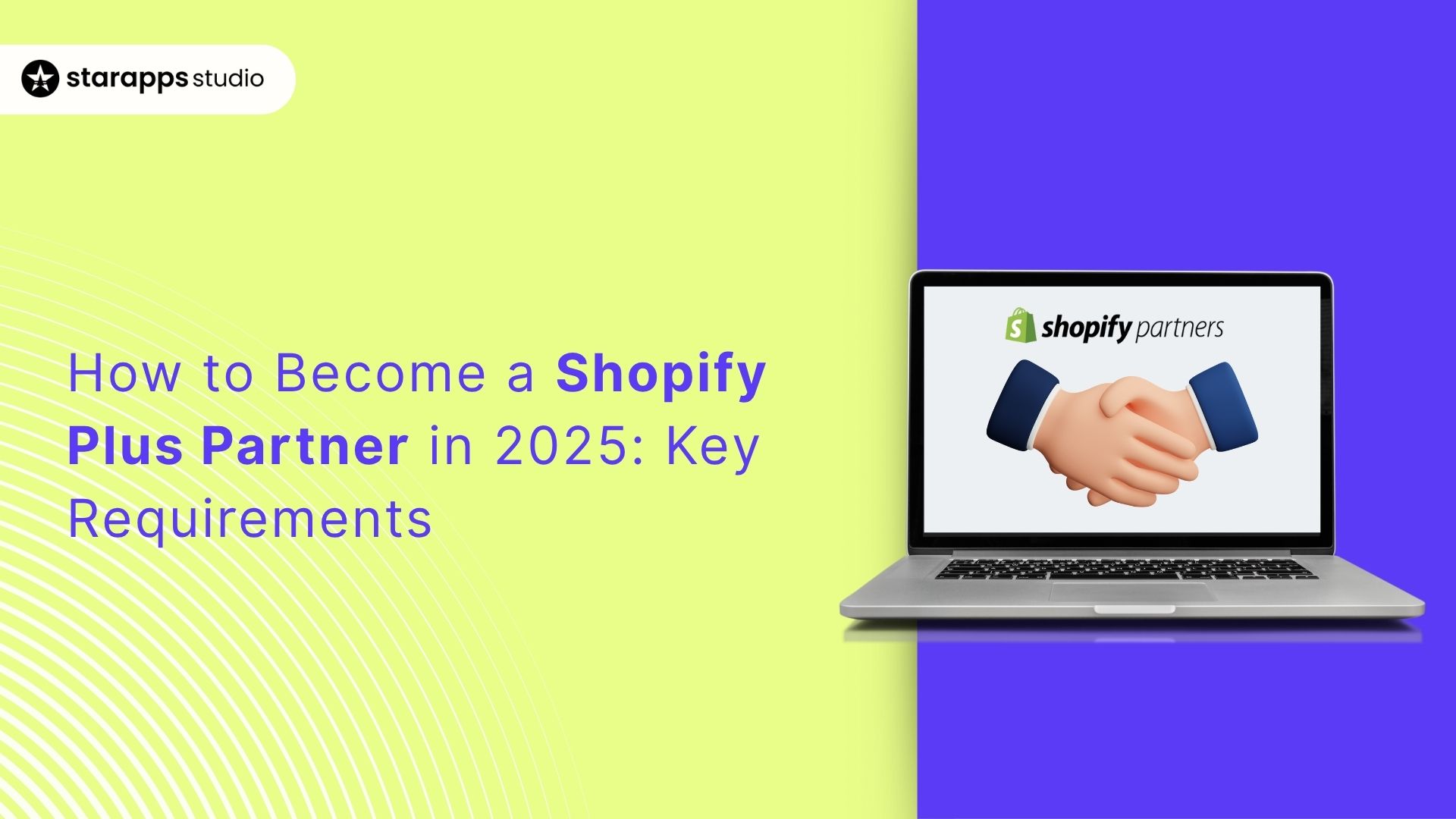
Learn Shopify Plus Partner requirements for 2025 and the steps to qualify, apply, and grow your business with Shopify Plus expertise.
As the Shopify ecosystem matures, the competition to serve enterprise merchants has never been higher. Brands are scaling faster, their operational needs are more complex, and only a select group of partners is trusted to deliver at that level. Becoming a Shopify Plus Partner represents that distinction, proof of capability, consistency, and achieving sustained growth.
Reaching this stage requires more than building beautiful stores. Shopify evaluates partners on measurable performance, verified expertise, and the ability to execute at enterprise scale. The process is selective for a reason: Plus Partners are expected to help merchants manage millions in revenue, streamline global operations, and unlock long-term growth.
This guide outlines the Shopify Plus Partner requirements that define eligibility in 2025. It breaks down what Shopify looks for, how to prepare for evaluation, and the strategies that strengthen your application. For agencies and technology providers ready to move from capable to category-leading, this framework sets the path forward.
Key Takeaways
- Earning Shopify Plus Partner status requires proven experience in enterprise-level solutions, measurable results, and strong technical expertise.
- Meeting commercial targets, verified certifications, and project complexity benchmarks are key eligibility factors.
- A well-documented portfolio and specialization in high-value niches improve application strength.
- Partnering with trusted solutions like StarApps Studio apps helps deliver scalable, high-performance Plus stores.
- Consistent learning, platform engagement, and operational excellence are essential for sustaining success in the Plus Partner ecosystem.
What Is a Shopify Plus Partner?
A Shopify Plus Partner is a certified agency or technology provider approved by Shopify to support enterprise-level merchants on the Shopify Plus platform. These partners are verified for advanced technical skills, experience with high-volume e-commerce operations, and the capacity to deliver large-scale, customized solutions.
They receive access to exclusive Shopify Plus tools, dedicated partner support, and directory recognition. This distinction ensures that brands using Shopify Plus can work with professionals qualified to manage complex builds, integrations, and international growth.
As of December 2024, Shopify reorganized its partner structure into tiered Service and Technology tracks. Entry to the Plus tier and above is by invitation only, based on proven performance and client success metrics.
What Are the Shopify Plus Partner Requirements?
Achieving Plus Partner status demands meeting specific thresholds across three critical categories. Shopify evaluates partners holistically, looking at both quantitative performance and qualitative excellence.
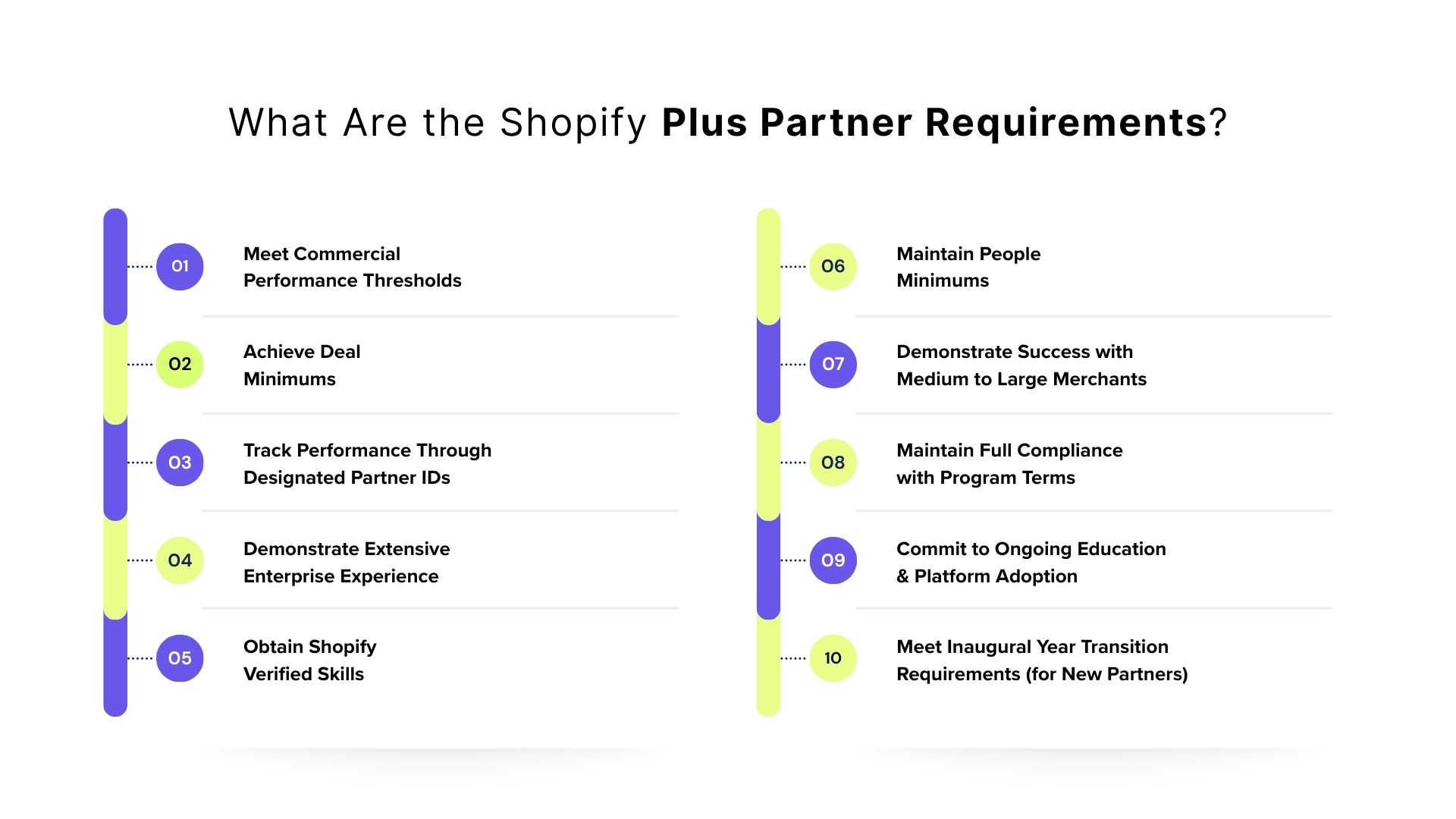
Let’s look at the key requirements for becoming a Shopify Plus Partner:
1. Meet Commercial Performance Thresholds
Your financial impact on Shopify's ecosystem is the primary gatekeeper. Shopify measures this through attributed revenue (the subscription fees generated by merchants you've referred, migrated, or influenced).
Key requirements
- For Service Partners, the Plus tier typically requires generating $ 100,000 or more in annual attributed Shopify revenue.
- This includes new merchant subscriptions, plan upgrades (especially to Plus), and referral commissions.
- Revenue must be tracked through your designated Partner ID.
- Higher tiers (Premier: $500,000+, Platinum: $ 1 million+) require a proportionally greater commercial impact.
The calculation includes more than one-time implementations. Shopify values recurring revenue, which means maintaining long-term client relationships is just as important as landing new projects. A partner who migrates five stores to Plus and supports them for years demonstrates more value than one who launches twenty stores that churn within months.
2. Achieve Deal Minimums
Beyond total revenue, Shopify tracks the quantity and quality of completed projects. Deal minimums ensure you're not reaching thresholds through a single massive client but demonstrating consistent capability.
Requirements include
- Minimum number of completed Shopify Plus implementations (typically 5-10 active Plus merchants).
- Proven success across diverse industries and use cases.
- Portfolio demonstrating complexity (integrations, custom apps, advanced workflows, not just theme customizations).
- Recent activity (deals completed within the past 12-24 months) counts more heavily.
Shopify wants partners who can replicate success. If your entire portfolio consists of fashion DTC brands, you might struggle to demonstrate versatility. Successful applicants typically show experience across B2B, B2C, international markets, and various business models.
Building that consistency often depends on the tools you use. Working with trusted Shopify apps, such as those from StarApps Studio, can help agencies streamline builds, maintain performance, and deliver Plus-level quality across every project.
3. Track Performance Through Designated Partner IDs
Every interaction with potential and existing merchants must be appropriately attributed to your Partner account. Without proper tracking, your work goes uncredited.
Critical implementation steps
- Ensure all team members use your organization's Partner ID when creating development stores.
- Include Partner ID parameters in referral links shared with prospects.
- Properly tag projects in the Partner Dashboard so Shopify can attribute revenue.
- Maintain accurate records of client implementations, even those that don't go through formal referral channels.
4. Demonstrate Extensive Enterprise Experience
Merchants require partners who have successfully solved complex problems in the past and can anticipate challenges before they become disasters.
What Shopify evaluates
- Years of documented Shopify experience (minimum 3-5 years preferred).
- Enterprise project complexity (headless commerce, ERP integrations, multi-store architectures).
- Client testimonials and case studies showing measurable business outcomes.
- Problem-solving capabilities beyond standard implementations.
Your portfolio should tell a story of increasing complexity and depth. Moving from basic store setups to custom checkout experiences to full headless implementations demonstrates growth that Shopify values. Including metrics such as conversion rate improvements, average order value increases, or page speed optimizations provides quantifiable proof of expertise.
5. Obtain Shopify Verified Skills
Credentials prove your team's technical and strategic knowledge. Shopify Verified Skills are earned through assessments on Shopify Academy and demonstrate mastery of specific platform capabilities.
Required credentials vary by track, but typically include
- Service Partners: Theme Development, App Development, Plus Strategy, Migration Specialist badges.
- Technology Partners: Integration credentials, security certifications, API expertise.
- Multiple team members must hold credentials (not just one technical lead).
- Credentials must be current (some require renewal every 1-2 years).
The breadth of your team's credentials matters. A partner with ten developers but no certified strategists or designers raises red flags. Shopify wants well-rounded teams that can handle every aspect of enterprise projects.
6. Maintain People Minimums
Enterprise projects require teams. Shopify sets minimum headcount requirements to ensure you have the capacity to deliver at scale.
Typical team composition requirements
- Minimum 5-10 full-time employees (varies by tier and track)
- Mix of developers, designers, project managers, and strategists
- Certified team members across multiple disciplines
- Documented availability to take on multiple simultaneous enterprise projects
Shopify may request organizational charts, LinkedIn profiles, and evidence that your team is genuinely committed to Shopify work. A lean, highly skilled team of seven dedicated Shopify specialists outperforms a bloated agency of thirty generalists, where Shopify is just one of many offerings.
7. Demonstrate Success with Medium to Large Merchants
Plus Partners must demonstrate their ability to handle the unique challenges of high-volume, high-stakes stores. Success with small businesses doesn't automatically translate to enterprise capability.
Evidence required
- Client portfolio featuring recognizable brands or substantial revenue volumes.
- Case studies demonstrating success with stores processing 10,000+ orders monthly.
- Experience managing international expansion, complex product catalogs (1,000+ SKUs), or advanced personalization.
- Testimonials from merchants specifically highlighting your ability to handle scale.
8. Maintain Full Compliance with Program Terms
Partnership is an ongoing relationship governed by Shopify's Partner Program Agreement. Violations can result in tier demotion or program removal.
Critical compliance areas
- Data Protection: Must meet GDPR, CPRA, and other privacy regulations when handling merchant data.
- Security Standards: Multi-factor authentication for all team members, regular security audits, and incident response procedures.
- Support Commitments: Maintaining response time SLAs (critical issues within 30 minutes for Technology Partners).
- Ethical Practices: No misleading marketing, proper use of Shopify branding, and transparent pricing.
Technology Partners face additional scrutiny. Apps must maintain a 4.0+ star rating with a minimum of 20 reviews, undergo annual third-party security penetration testing, and provide a letter of validation from approved security vendors. Service Partners must avoid conflicts of interest and maintain professional standards in all interactions with clients.
9. Commit to Ongoing Education & Platform Adoption
The Shopify platform evolves constantly. Partners must stay current with new features, best practices, and ecosystem changes.
Required ongoing activities
- Regular participation in Shopify Academy courses with new content releases.
- Attendance at Shopify partner events (Unite conference, regional meetups, webinars).
- Adoption of new platform features within reasonable timeframes.
- Active engagement with Shopify's partner community forums and resources.
Shopify tracks engagement metrics. Partners who never attend events, ignore new feature rollouts, or fail to adapt their services as the platform evolves face questions during tier reviews.
10. Meet Inaugural Year Transition Requirements (for New Partners)
If you're newly entering the Plus tier, Shopify imposes additional scrutiny during your first 12 months. This probationary period ensures you can sustain performance.
First-year expectations
- Maintain or exceed the commercial performance that earned you Plus status.
- Successfully deliver at least 2-3 new Plus projects demonstrating continued capability.
- Gather positive merchant feedback and testimonials.
- Participate actively in partner enablement programs.
- Demonstrate you're building sustainable practices.
Shopify validates that your ascension wasn't a fluke. Partners who hit thresholds through unsustainable efforts often struggle in year two. Successfully navigating this transition period typically requires a conservative approach to growth planning. Focus on delivering exceptional results for a manageable client load, rather than taking every project that is offered.
How to Become a Shopify Plus Partner?
Meeting requirements is one challenge. Strategically positioning yourself to achieve Plus Partner status is another key step. Here's the practical roadmap that successful partners follow.
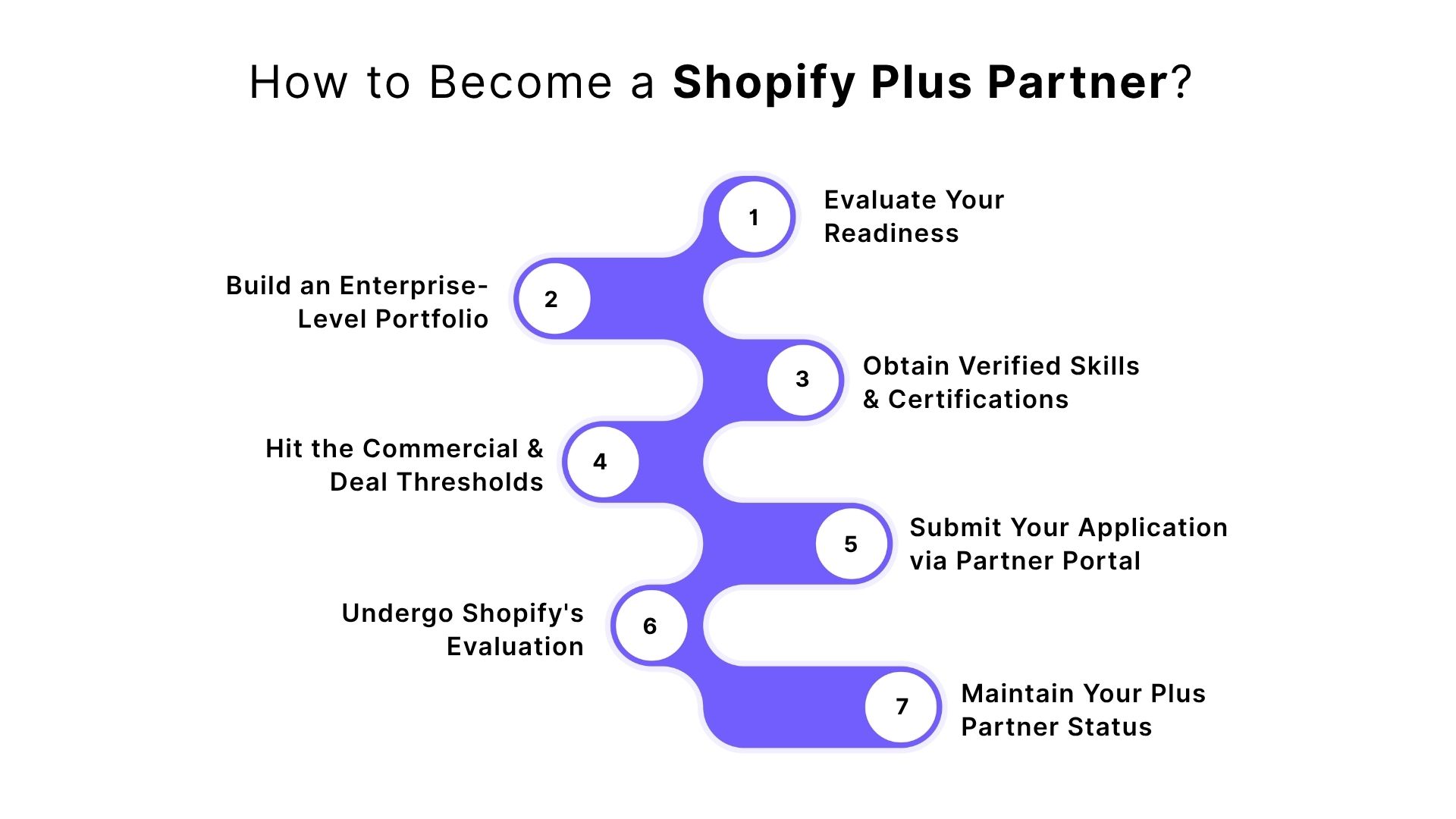
Step 1: Evaluate Your Readiness
Before investing heavily in a Plus Partnership pursuit, honestly assess your standing against the requirements. This prevents wasted effort and helps you identify gaps that need to be addressed first.
- Commercial Performance: Calculate your current attributed Shopify revenue. Are you at 50% of the Plus tier requirements? 75%? If you're below 30%, focus on growing your base partner activity before targeting Plus status.
- Portfolio Assessment: Review your completed projects. How many are enterprise-level? Do you have case studies demonstrating complexity? Can you articulate measurable business outcomes?
- Team Capabilities: Count certified team members, evaluate skill gaps, and determine if you have the bandwidth to handle multiple enterprise projects simultaneously.
- Financial Runway: Plus-level projects often have longer sales cycles and payment terms. Do you have the cash flow to sustain operations during 3-6 month enterprise sales processes?
Be honest about your current position.
Step 2: Build an Enterprise-Level Portfolio
Your portfolio is your proof. Shopify evaluates partners based on demonstrated capability. You need evidence of enterprise success before you'll be considered for Plus status.
- Target enterprise merchants proactively: Don't wait for Plus clients to find you. Identify growing mid-market brands that are outgrowing standard Shopify and position yourself as their partner for Plus migration.
- Accept strategic projects at reduced rates: Your first 2-3 Plus-level projects might not be as profitable as you'd like, but they're investments in your Plus Partnership application. Prioritize impressive clients and complex problems over maximum margin.
- Document everything: Start building case studies immediately. Track before/after metrics, client testimonials, technical challenges overcome, and business results achieved.
- Diversify your experience: If you only have experience with DTC fashion brands, consider seeking B2B manufacturing or international expansion projects. Breadth of experience strengthens your application.
Step 3: Obtain Verified Skills & Certifications
While building your portfolio, systematically work through Shopify Academy certifications. Schedule dedicated time for your team to complete required learning paths.
- Map requirements to team roles: Developers complete technical certifications (Theme Development, App Development, API). Designers focus on UX and conversion credentials. Strategists pursue the Plus Strategy and Migration Specialist paths.
- Schedule learning sprints: Dedicate one Friday per month to certification work, or allocate 2-3 hours weekly for team members to progress through courses.
- Go beyond minimums: If the Plus tier requires five certified team members, aim for seven or eight. Exceeding minimums demonstrates commitment and provides redundancy if team members leave.
- Maintain currency: Some certifications expire. Build calendar reminders for renewal assessments to ensure credentials stay current.
Step 4: Hit the Commercial & Deal Thresholds
As the portfolio and certifications progress, focus intensively on commercial performance. This is often the longest phase, as building attributed revenue takes time.
- Maximize referral attribution: Every pitch to a prospect should include your Partner ID. When merchants ask questions in forums or at events, provide value and guide them to engage through your partner channels, allowing you to receive credit.
- Focus on Plus migrations: A merchant upgrading from standard Shopify to Plus generates significant attributed revenue. Position yourself as the migration specialist who makes the transition seamless.
- Build recurring relationships: One-time implementations are fine, but retained clients generate ongoing attributed revenue. Offer maintenance retainers, optimization services, and strategic consulting to keep merchant relationships active.
- Network strategically: Attend Shopify events and build relationships with Shopify's sales team. Internal referrals from Shopify employees carry significant weight.
Step 5: Submit Your Application via Partner Portal
Once you've hit all requirements, it's time to formally apply. For Technology Partners at the Plus tier and above, this is an invitation-only event. Shopify reaches out when they determine you're ready. For Service Partners, the process varies.
- Compile comprehensive documentation: Gather case studies, client testimonials, team credentials, revenue reports, and portfolio screenshots. Shopify will request extensive evidence during review.
- Craft your narrative: Tell the story of why you're ready for Plus Partnership. What makes your approach unique? How have you demonstrated enterprise capability? What value will you bring to Plus merchants?
- Highlight specializations: If you have unique expertise (international expansion, subscription models, B2B wholesale), emphasize this. Shopify values specialists who can solve specific challenges faced by Plus merchants.
- Prepare references: Shopify may contact your clients directly. Briefly inform key clients that they may receive outreach and ensure they're prepared to speak positively about your partnership.
For Service Partners, access your Partner Dashboard, navigate to the tier progression section, and submit your application when prompted. For Technology Partners, build relationships with Shopify's partner management team. Attend developer events, actively engage on partner forums, and showcase your readiness to collaborate.
Step 6: Undergo Shopify's Evaluation
Application submission begins a review process that typically takes 4-8 weeks, sometimes longer for complex cases. Shopify conducts thorough vetting to protect merchant interests and program integrity.
What happens during evaluation
- Application review: Shopify's partner team examines your submitted documentation, verifying certifications, revenue claims, and portfolio work.
- Reference checks: They may contact your listed clients to validate the work you described and gather unscripted feedback about your performance.
- Technical assessment: For Technology Partners, expect a detailed technical review of your app's architecture, security practices, and performance metrics.
- Interview stage: You may be asked to present your business, walk through case studies, or discuss your approach to common challenges faced by Plus merchants.
- Stakeholder approval: Final decisions involve multiple Shopify teams, including partner management, regional leads, and sometimes product teams if you have specialized focus areas.
If Shopify requests additional information or clarification, respond within 24-48 hours. Delays signal a lack of seriousness and can stall your application indefinitely.
Prepare for possible outcomes. Approval, conditional approval (requiring specific improvements before final acceptance), or denial (with feedback on gaps to address). If denied, Shopify typically provides specific feedback on what you need to strengthen before reapplying.
Step 7: Maintain Your Plus Partner Status
Achieving Plus Partnership is the beginning. Maintaining your tier requires ongoing performance that meets or exceeds the standards that earned you entry.
Ongoing requirements
- Annual performance reviews: Shopify evaluates partners yearly, reviewing commercial performance, merchant satisfaction, certification currency, and program compliance.
- Minimum activity thresholds: You must maintain the commercial performance and deal minimums that qualified you. Falling below thresholds triggers warnings and may result in potential tier demotion.
- Merchant satisfaction: Poor client experiences, negative reviews, or patterns of complaints can result in tier loss even if your commercial numbers remain strong.
- Platform engagement: Continue attending events, completing new certifications as released, and adopting new platform capabilities.
Build sustainable practices. A partner who delivers exceptional results for ten Plus merchants will maintain their tier more easily than one who churns through thirty mediocre projects. Quality compounds over time.
Utilize your Plus Partner status to secure better clients, command higher rates, and gain access to Shopify resources that simplify delivery. Your tier is a business asset.
Partner with the Right Tools to Achieve Shopify Plus Standards
Reaching Shopify Plus Partner status requires more than technical capability. It demands building scalable, reliable, and conversion-optimized experiences for enterprise merchants. To meet those expectations, having trusted technology allies matters just as much as your internal expertise.
StarApps Studio is one such partner that strengthens your delivery framework. As an official Shopify App Developer and Technology Partner trusted by over 20,000 merchants, including more than 1,000 Plus stores, StarApps helps agencies and developers streamline complex builds and maintain performance at scale.
The suite of apps addresses the biggest challenges faced by Plus-level merchants, including managing extensive variant catalogs, enhancing SEO performance, and increasing conversions. Below is an overview of how each solution supports your journey toward achieving Plus-level quality and consistency.
Color Swatch King
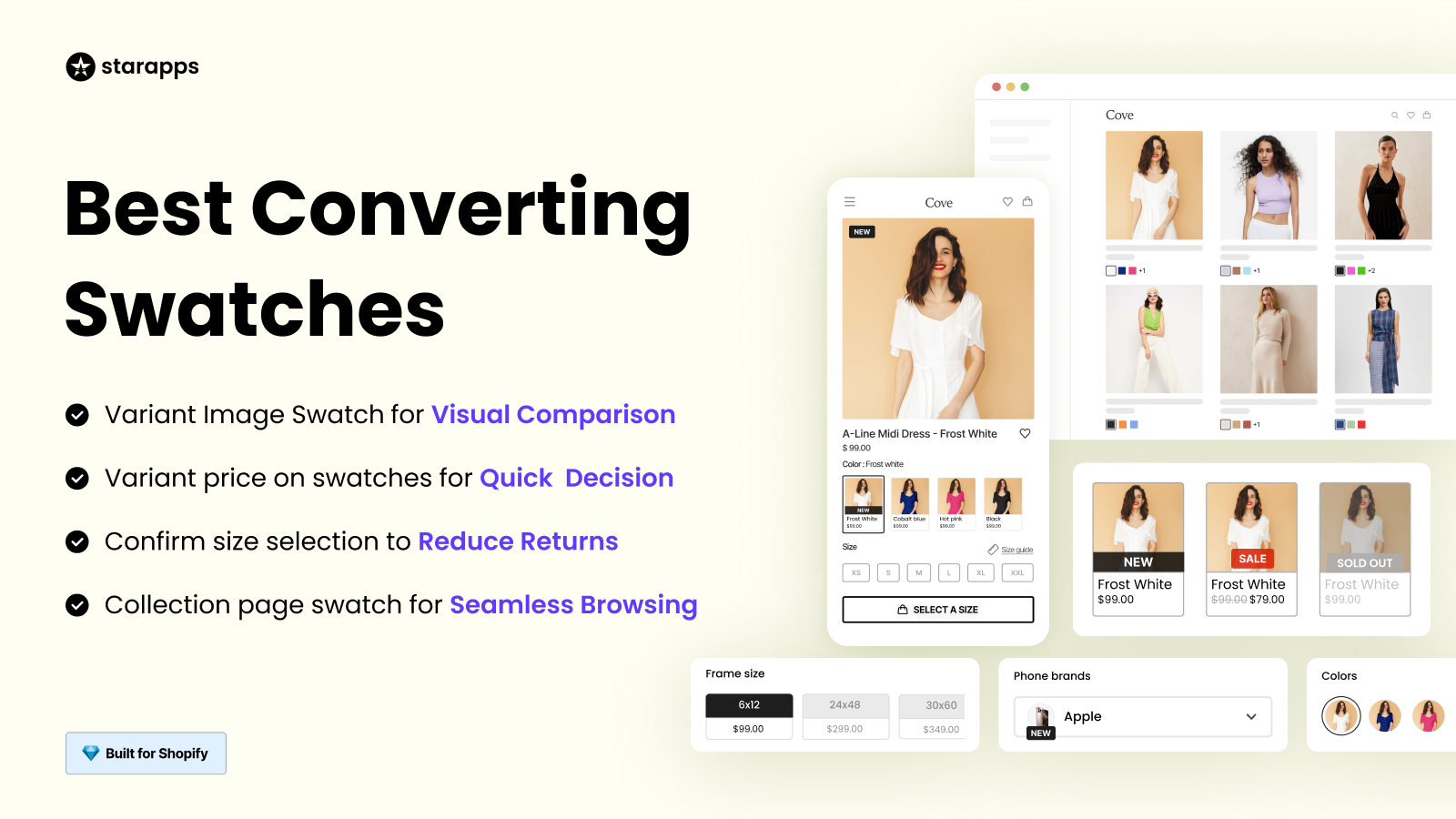
- Simplifies variant selection by displaying intuitive color and image swatches directly on product and collection pages.
- Handles thousands of product variations smoothly, keeping navigation fast and user-friendly.
- Reduces the need for custom theme coding while enhancing the visual shopping experience for high-volume merchants.
- Helps you deliver professional, enterprise-ready product displays that align with Shopify Plus user experience expectations.
SA Variant Image Automator
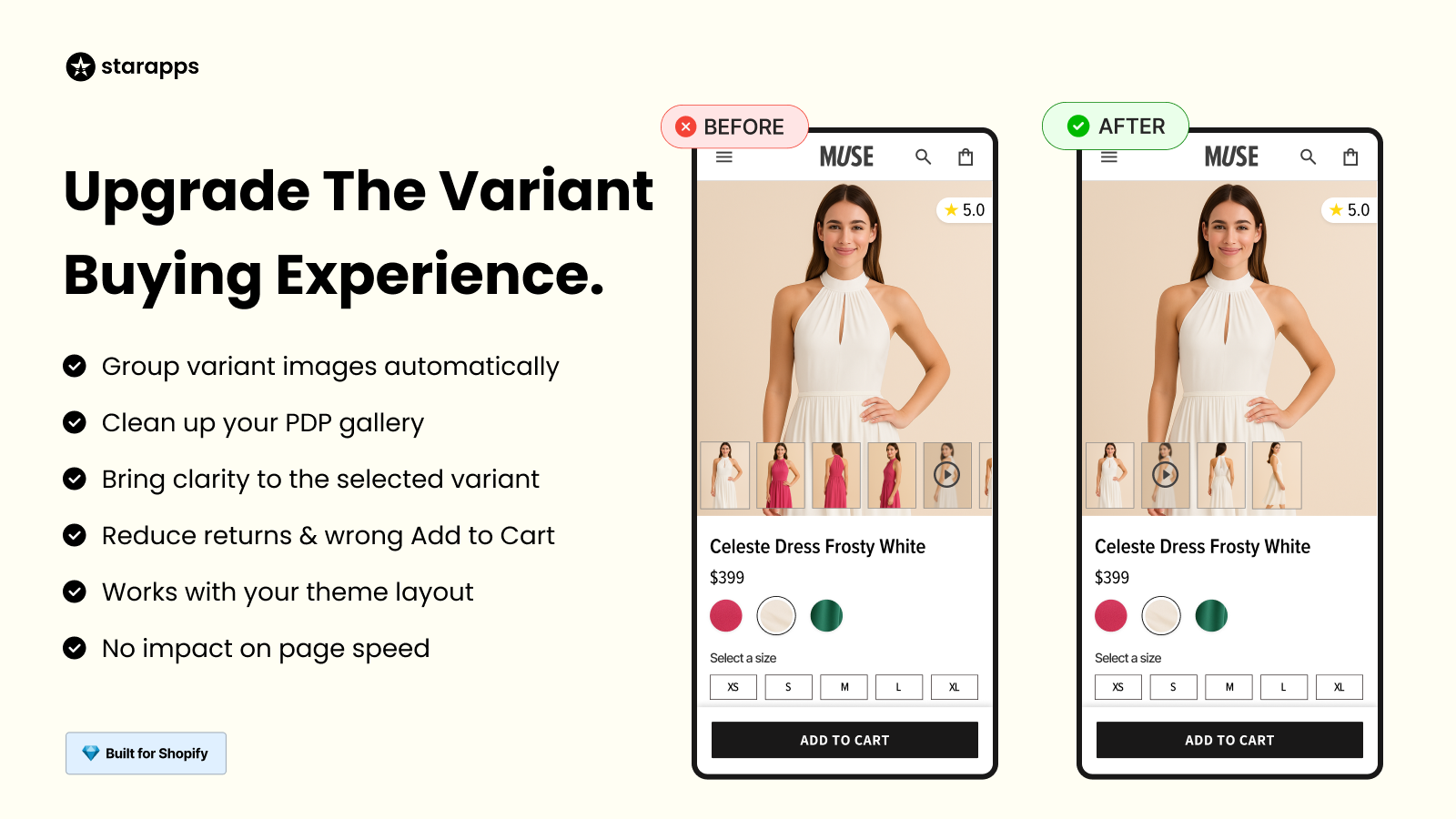
- Automatically connects the correct product images to their related variants, removing the risk of manual setup errors.
- Ensures consistent, accurate visuals across product galleries, even for large catalogs.
- Integrates seamlessly with any theme, saving developer time and reducing testing effort.
- Supports Plus-focused agencies in scaling projects faster by automating time-consuming variant management workflows.
Variant Alt Text King
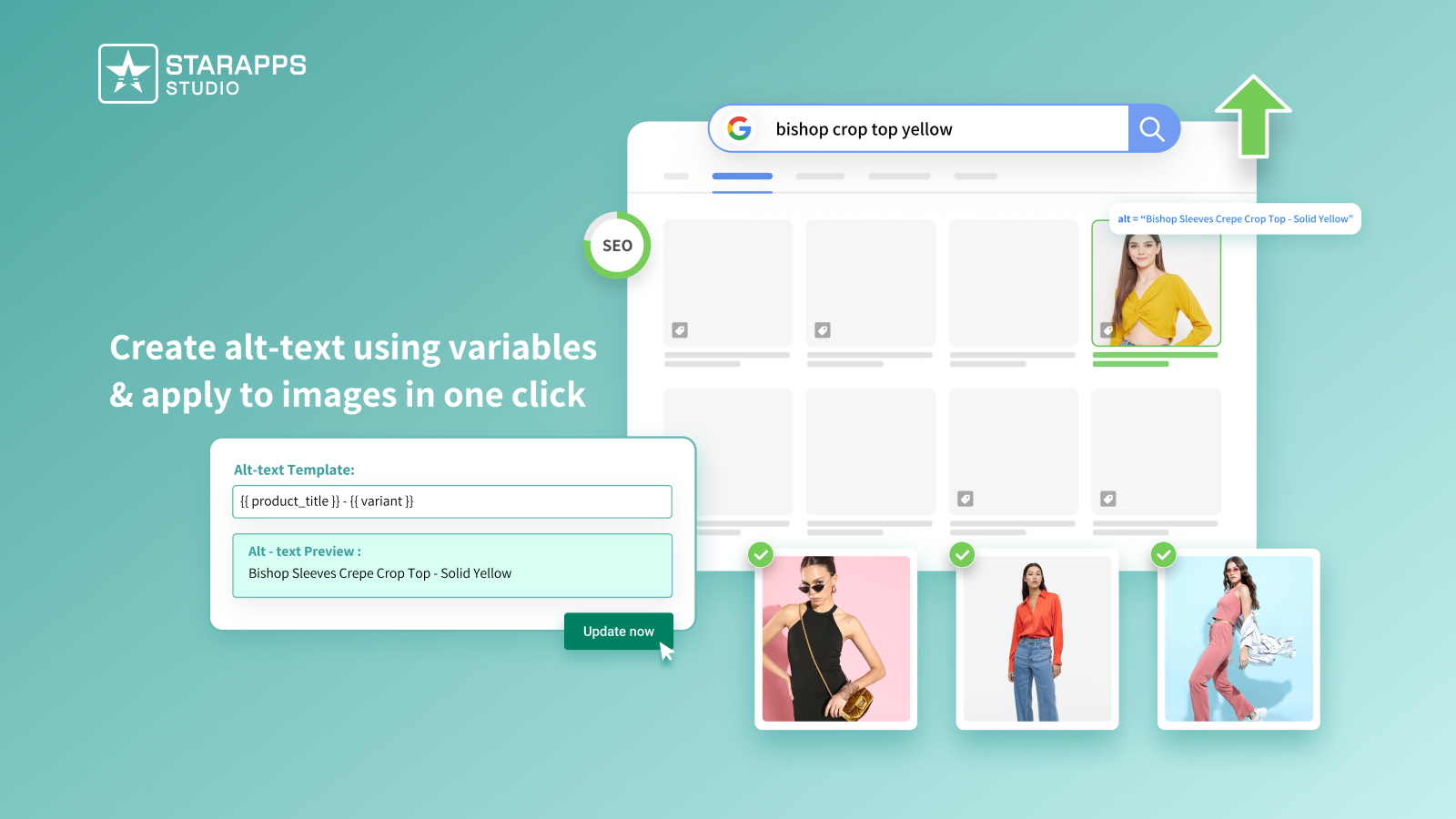
- Automatically generates SEO-friendly alt text for every product image to enhance accessibility and search visibility.
- Maintains compliance with key accessibility standards, including the ADA and WCAG.
- Reduces manual workload for optimization across thousands of listings.
- Enables agencies pursuing Plus Partner status to deliver enterprise-grade SEO optimization effortlessly, strengthening their application credibility.
SA Variants (Combined Listings)

- Creates unique URLs for each product variant, allowing better indexing and search coverage.
- Improves organic traffic by capturing variant-specific and long-tail keyword searches.
- Enhances discoverability across stores with extensive product catalogs.
- Allows Plus Partners to demonstrate clear SEO performance improvements that increase merchant ROI and meet Plus-level evaluation standards.
Incorporating StarApps Studio into your strategy means you are building smarter, faster, and more reliable Shopify Plus solutions that consistently meet enterprise expectations.
Conclusion
The Shopify Plus Partner requirements establish a clear benchmark for agencies and technology providers seeking to serve enterprise merchants. They reflect Shopify’s focus on proven performance, technical depth, and consistent delivery at scale. Reaching this level means demonstrating commercial impact, maintaining verified skills, and showing the ability to manage complex projects with precision.
As you work toward Plus Partner status, building a strong foundation of reliable tools and efficient systems is essential. Solutions from StarApps Studio can complement your efforts by helping manage large product catalogs, streamline variant workflows, and improve SEO and product visibility. These capabilities make it easier to deliver the kind of dependable performance Shopify expects from its top-tier partners.
Success in the Plus Partner program comes from steady progress and well-structured practices. Keep refining your expertise, strengthening your operations, and aligning your approach with enterprise standards.
To begin building a stronger foundation for your Plus journey, get in touch and start moving toward your next milestone with confidence.
FAQ’s
1. What is the commission for a Shopify Plus Partner?
Shopify Plus Partners typically earn a recurring commission based on merchant subscriptions they refer or manage, calculated from the attributed revenue generated through their Partner account.
2. What are the limitations of Shopify Plus?
Shopify Plus has several limitations, including limited backend customization options, dependency on Shopify’s infrastructure, API rate limits, and additional costs for advanced integrations or third-party applications.
3. How long does it take to become a Shopify Plus Partner?
The approval timeline varies depending on eligibility and the readiness of documentation. Most qualified applicants complete the process within two to three months after meeting all program requirements.
4. How do Shopify Plus Partners maintain their status?
Partners must maintain performance thresholds, current certifications, and positive merchant feedback while staying active in Shopify’s ecosystem through continued learning and engagement.
5. Do you need a minimum number of clients to qualify for Shopify Plus Partner status?
Yes, Shopify generally expects a portfolio of at least five to ten active Plus merchants to demonstrate consistent enterprise-level experience and service capability.
Heading
End-to-end traceability
To ensure regulatory compliance, you must have a complete overview of your products from production to shipping. Book a demo to see how Katana can give you full visibility of your operations.


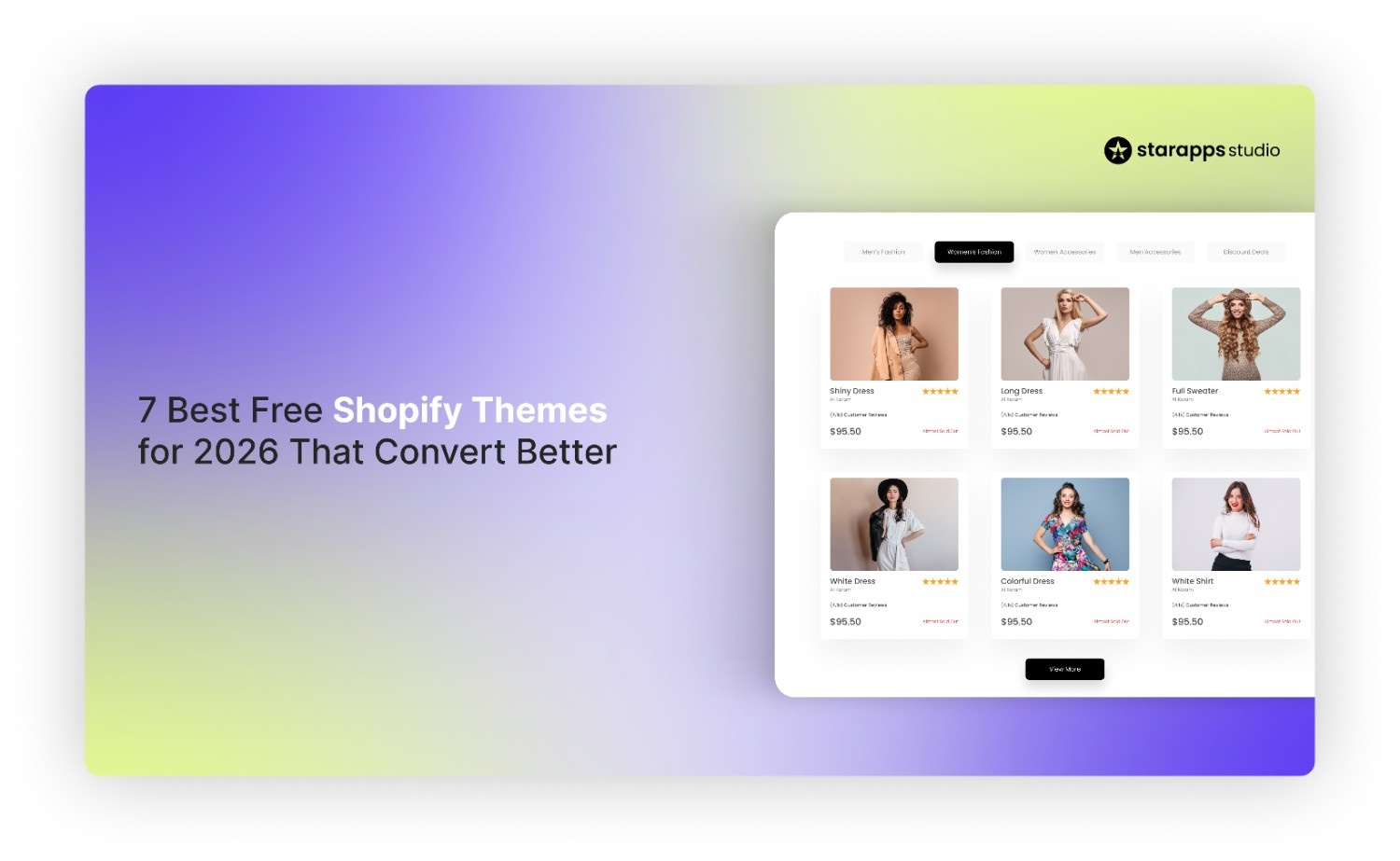
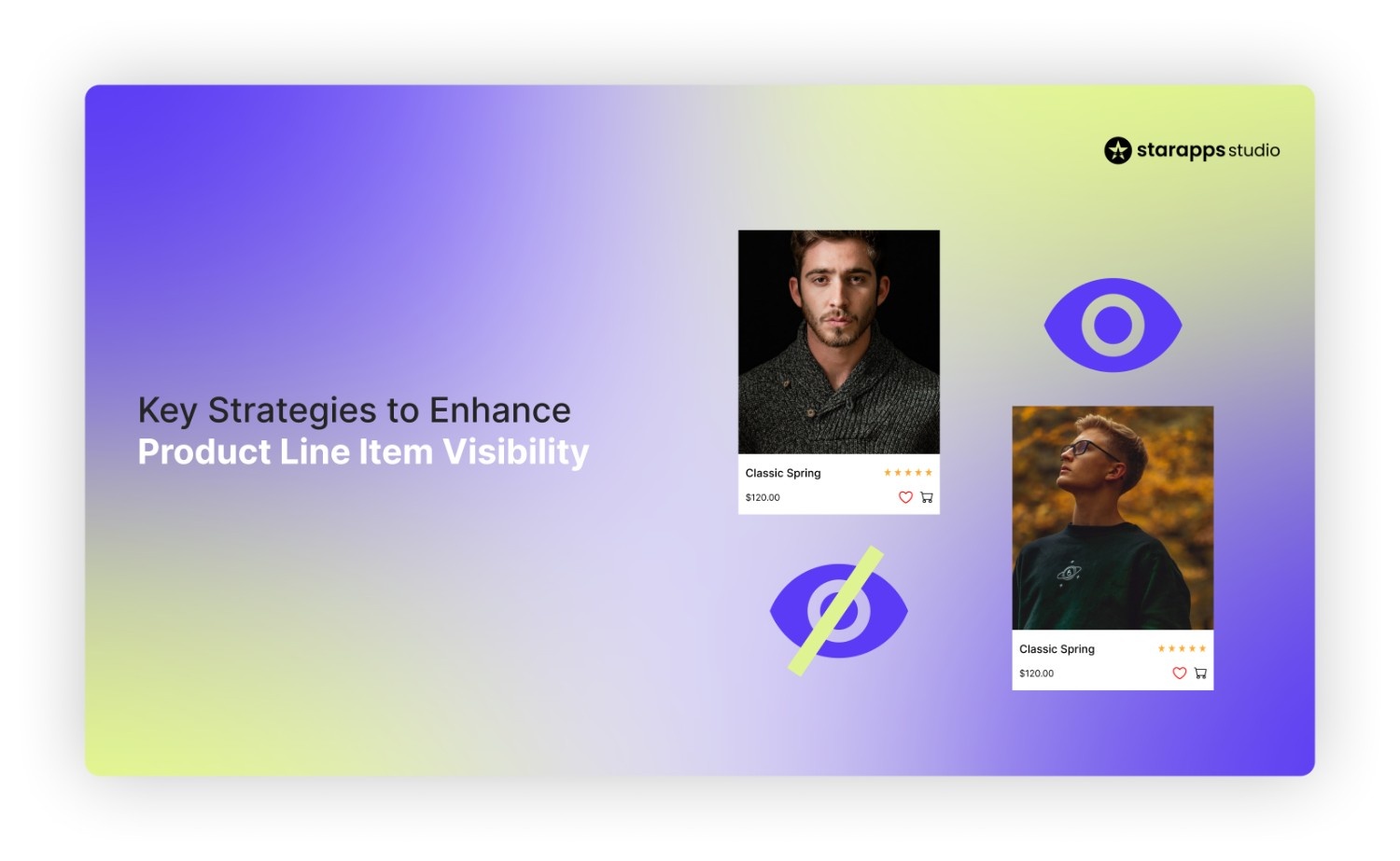
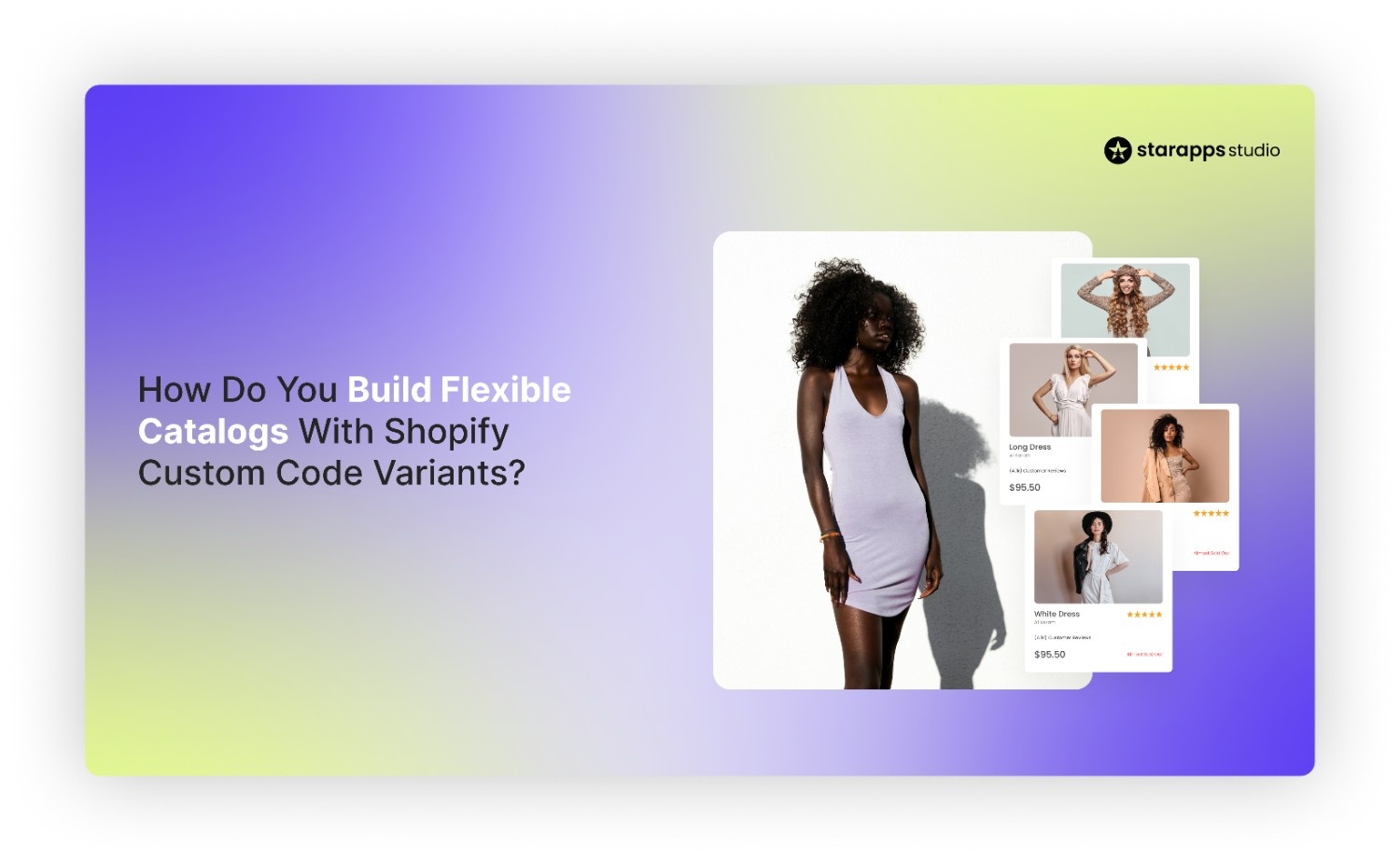
.png)
.png)